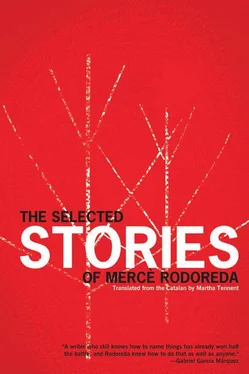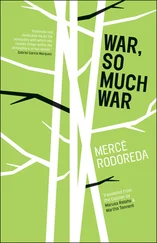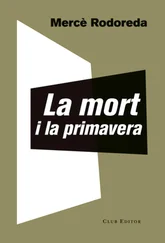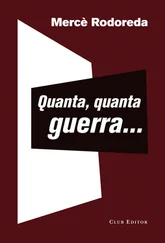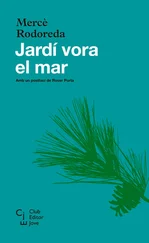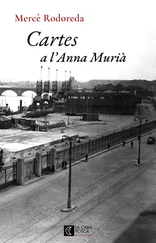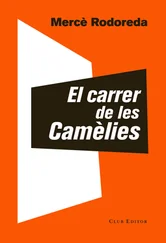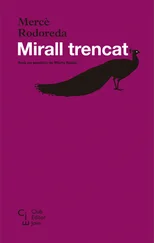“You don’t think she’s too delicate to be out in this wind?”
He was confronted by a hard look and heard the woman hold her breath between clenched teeth. He stood there a moment, hesitating.
“None of my business. I can see you’re not the talkative kind. Salut.” He limped away, up a diagonal path toward a vineyard that hugged the slope like a green sheet spread across the arid land. Without turning her head, she followed him with her eyes. He walked fast. Soon she could see only a dark smudge against the bright horizon.
She placed the sleeping infant on the ground, then picked up a nearby rock. She pulled a dirty rope from her pocket and began to wind it around the rock. Two red, feverish spots shone on her emaciated cheeks. The sun caught blue reflections in her hair and made her bloodless fingernails shimmer as her hands knotted the rope.
She strode back to the child’s side and knelt down. Slowly she slipped the rope under her head. The baby whimpered and clenched its fists without waking up.
“Hush, little thing, Go to sleep,” she whispered as she picked up the baby.
The girl had to make an effort to stand up. She placed the rock on the baby’s stomach and walked to the water’s edge. Her feet plunged into the mud. She took a step forward, glanced around with bulging eyes, and threw it as hard as she could.
She heard the sound of water ripping. The body floated a moment, then suddenly disappeared as if someone had jerked it. A flock of birds screeched as it crossed the calm sky. There were many of them, flying in broad rows, carving a black path through the blue.
She faced the wind, walking stiffly — as if with wooden legs — up the same path the old man had taken, following the birds’ screeches.
•
In the distance you could see four scattered houses. By the road, in a patio beneath an arbor of ivy and roses, stood a few tables with iron chairs. She was seated at the back. The setting sun blazed across the sky, and far away the winding river flowed blood red.
She hadn’t walked far. From the bridge to the arbor was a scant half hour, but she had sat on the ground for a long time gazing at the river. She was exhausted, her back and sides ached. The milk from her swollen breasts had dampened her blouse. She was thirsty, and a vein was pulsing on the left side of her neck.
Two men were coming along the road. They stopped, leaned their bicycles against the wall, crossed the patio, and went inside the building.
“I see you got a new customer, mestressa ,” the man said, addressing the woman who ran the café. He was middle-aged and had shiny black eyes, dark cheeks, a dark chin, and what appeared to be rough skin. Drops of sweat covered his forehead, and he brushed them away with his hand. His shirt was stuck to his chest, soaking wet.
“What do you say, Belcacem?”
He elbowed his companion, a small, olive-skinned Arab with a large scar across his cheek. The Arab laughed, his teeth gleaming for an instant.
From behind the counter the old woman, a black scarf around her head, pulled out two glasses.
“She’s been here for close to an hour. What are you doing at the quarry with all that blasting?”
The water from the faucet flowed furiously into the zinc basin, splashing the edges with fat, round drops that immediately dribbled down the sides. The woman picked up a bottle of vermouth. The cork squeaked.
“Passing time, mestressa , passing time.” The man picked up the glass, held it up to the light. “Evening, Violeta.”
The servant girl was wiping the tables. She was wearing a short skirt, and when she leaned over you could see the tops of her stockings.
“You gonna say yes to me tonight, Violeta?”
The Arab had finished his vermouth and was standing at the door looking out.
“I won’t have anything to do with family men,” she replied. Her cheeks were round and innocent. She had one lazy eye.
The man by the counter clucked his tongue, ran a finger under his nose, and called out, “You hear what she said, Belcacem?”
The Arab turned around, “Shut up. Look what the girl’s doing out there.”
His companion went over to him, and they stared at the girl through the strings of bamboo beads that served as a curtain. She was seated quietly under the arbor with an empty bottle in front of her. It had been filled with gasosa , a lemon-lime soda water. Her eyes were closed, and her hand was inside her blouse, touching her breast. The old woman turned on the faucet again. When the girl outside heard the sound of water, she opened her eyes and glanced around with a frightened look.
“She asked for an anise,” Violeta said, all excited. “When I asked if she wanted it straight or with water, she gave me a strange look, like she just dropped from the moon. I don’t think she’s all there.”
The old woman came out from behind the counter and looked through the beaded curtain at the girl.
“She must not be from around here,” Violeta said. “I asked her again how she wanted her anise and she said, ‘Bring me some gasosa .’ Must’ve changed her mind. As I was walking away, I turned back, ’cause I thought she said something. But it wasn’t to me.” She paused, raised her head, and looked at the men. “She was talking to herself.” Violeta stopped drying her hands on her apron and started laughing, a squeaky laugh that sounded like a rat.
“I’ll get her chattering, mestressa , you’ll see. Bring us some wine. Come along, Belcacem.”
He pulled aside the bamboo beads and walked out, the Arab following him. When they reached the table, the girl skittered like a frightened animal.
“No reason to be scared, princess. He’s black, but he’s got a good heart.”
They sat down at her table. She stared at them. One of her eyes had a burst blood vessel, and her black, oily hair fell across her face. She brushed it aside with a bony hand, her fingers extended as if they were made of stone. A rose petal floated down onto the table. The thick smell of burning oil wafted from the kitchen, blending with the perfume of evening and roses.
Violeta placed three glasses and a bottle of wine on the table. She went back inside, but stopped at the threshold, staring curiously at them, her mouth open, eyes round. She slipped a hand under her skirt and absentmindedly scratched her thigh. The beaded strings of the curtain flapped against each other, making a sound like the clacking of lace bobbins. It kept her from hearing anything outside. She watched the Arab hand the girl a glass, but she shook her head. After the two men had drunk and refilled their glasses, the girl picked up hers and raised it to her lips. It seemed as if she were going to hold it there forever, but finally she downed it in one sip, her eyes shut. Belcacem whispered in her ear. Only the back of the other man was visible. From time to time his shoulders shook as if he were laughing.
The old woman came out of the kitchen and went behind the counter, locked the drawer, and pocketed the key.
“So is that how you help me fix supper, Violeta, you lazy good-for-nothing? Leave the men alone; they’re in the mood for playing around.”
Reluctantly Violeta walked away and entered the smoke-filled kitchen. She took off the white apron she used for waiting on customers and put on the navy blue one hanging behind the door. She lifted the lid on the frying pan and stirred the potatoes. Some had burned. Through the window the sky was mauve-colored with a band of pink in the distance. The patio was darkening. The old woman switched on the light. The glasses on the sideboard and the aluminum pans hanging on the wall started to glimmer.
Suddenly, outside, they heard cries and the sound of breaking glass.
Читать дальше
